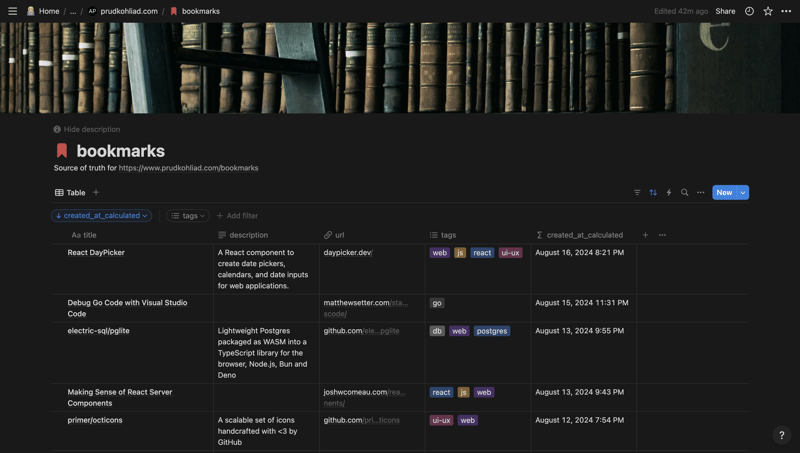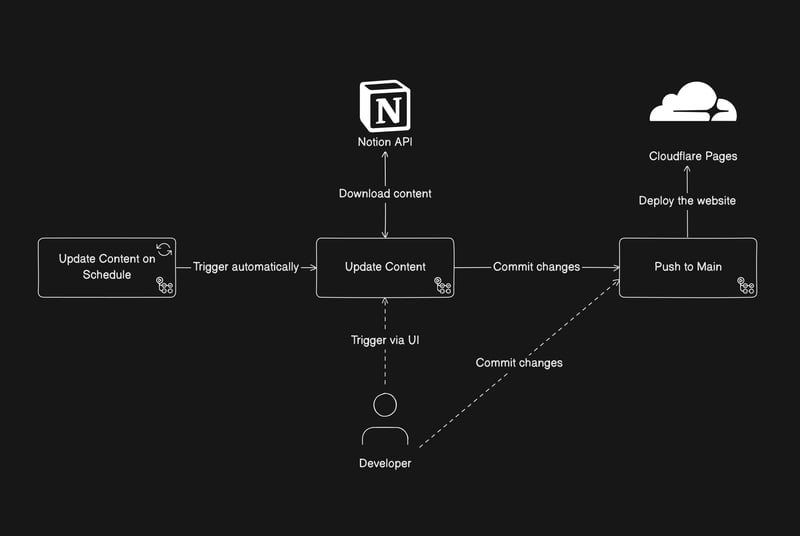Updating website content on schedule via GitHub Actions
I would like to share my journey on building a self-sustainable content management system that does not require a content database in a traditional sense.
The Problem
The content (blog posts and bookmarks) of this website is stored in a Notion database:

The problem that I was trying to solve was to not have to deploy the website manually after each bookmark that I add there. And on top of that – keep the hosting as cheap as possible, because for me it does not really matter how fast the bookmarks that I add to my Notion database end up online.
So, after some research I came up with the following setup:

The system consists of several components:
- The “Push to Main” action that deploys the changes
- The “Update Content” action that downloads content from Notion API and commits the changes
- The “Update Content on Schedule” action runs once in a while and triggers the “Update Content” action
Let us look into each one of them from the inside out in detail.
The “Push to Main” Workflow
There is not a lot to say here, pretty standard setup, – when there is a push to the main branch, this workflow builds the app and deploys it to Cloudflare Pages using the Wrangler CLI:
name: Push to Main
on:
push:
branches: [main]
workflow_dispatch: {}
jobs:
deploy-cloudflare-pages:
runs-on: ubuntu-latest
timeout-minutes: 5
steps:
- name: Checkout
uses: actions/checkout@v4
- name: Setup pnpm
uses: pnpm/action-setup@v4
- name: Setup Node
uses: actions/setup-node@v4
with:
node-version-file: .node-version
cache: pnpm
- name: Install node modules
run: |
pnpm --version
pnpm install --frozen-lockfile
- name: Build the App
run: |
pnpm build
- name: Publish Cloudflare Pages
env:
CLOUDFLARE_ACCOUNT_ID: ${{ secrets.CLOUDFLARE_ACCOUNT_ID }}
CLOUDFLARE_API_TOKEN: ${{ secrets.CLOUDFLARE_API_TOKEN }}
run: |
pnpm wrangler pages deploy ./out --project-name ${{ secrets.CLOUDFLARE_PROJECT_NAME }}
The “Update Content” Workflow
This Workflow can only be triggered “manually”… but also automatically because you can trigger it using a GitHub Personal Access Token, a.k.a. PAT. I initially wrote it because I wanted to deploy changes from my phone. It downloads the posts and bookmarks using the Notion API and then – if there are any change to the codebase – creates a commit and pushes it. In order to function properly, this workflow must be provided with a PAT that has “Read and Write access to code” of the repository:
name: Update Content
on:
workflow_dispatch: {}
jobs:
download-content:
runs-on: ubuntu-latest
timeout-minutes: 5
steps:
- name: Checkout
uses: actions/checkout@v4
with:
# A Github Personal Access Token with access to the repository
# that has the follwing permissions:
# ✅ Read and Write access to code
token: ${{ secrets.GITHUB_PAT_CONTENT }}
- name: Setup pnpm
uses: pnpm/action-setup@v4
- name: Setup Node
uses: actions/setup-node@v4
with:
node-version-file: .node-version
cache: pnpm
- name: Install node modules
run: |
pnpm --version
pnpm install --frozen-lockfile
- name: Download articles content from Notion
env:
NOTION_KEY: "${{ secrets.NOTION_KEY }}"
NOTION_ARTICLES_DATABASE_ID: "${{ secrets.NOTION_ARTICLES_DATABASE_ID }}"
run: |
pnpm download-articles
- name: Download bookmarks content from Notion
env:
NOTION_KEY: ${{ secrets.NOTION_KEY }}
NOTION_BOOKMARKS_DATABASE_ID: ${{ secrets.NOTION_BOOKMARKS_DATABASE_ID }}
run: |
pnpm download-bookmarks
- name: Configure Git
run: |
git config --global user.email "${{ secrets.GIT_USER_EMAIL }}"
git config --global user.name "${{ secrets.GIT_USER_NAME }}"
- name: Check if anything changed
id: check-changes
run: |
if [ -n "$(git status --porcelain)" ]; then
echo "There are changes"
echo "HAS_CHANGED=true" >> $GITHUB_OUTPUT
else
echo "There are no changes"
echo "HAS_CHANGED=false" >> $GITHUB_OUTPUT
fi
- name: Commit changes
if: steps.check-changes.outputs.HAS_CHANGED == 'true'
run: |
git add ./src/content
git add ./public
git commit -m "Automatic content update commit"
git push
The “Update Content on Schedule” Workflow
This one is pretty simple: it just runs every once in a while and triggers the workflow above. In order to function properly, this workflow must be provided with a GitHub PAT that has “Read and Write access to actions” of the repository. In my case it’s a different PAT:
name: Update Content on Schedule
on:
schedule:
- cron: "13 0,12 * * *"
workflow_dispatch: {}
jobs:
trigger-update-content:
runs-on: ubuntu-latest
timeout-minutes: 5
steps:
- name: Checkout
uses: actions/checkout@v4
- name: Dispatch the Update Content workflow
env:
# A Github Personal Access Token with access to the repository
# that has the follwing permissions:
# ✅ Read and Write access to actions
GH_TOKEN: ${{ secrets.GITHUB_PAT_ACTIONS }}
run: |
gh workflow run "Update Content" --ref main
Conclusion
For me this setup has proven to be really good and flexible. Because of the modular structure, the “Update Content” action can be triggered manually – e.g. from my phone while travelling. To me this was another valuable experience of progressive enhancement of a workflow.
Hope you find this helpful ?
The above is the detailed content of Updating website content on schedule via GitHub Actions. For more information, please follow other related articles on the PHP Chinese website!

Hot AI Tools

Undresser.AI Undress
AI-powered app for creating realistic nude photos

AI Clothes Remover
Online AI tool for removing clothes from photos.

Undress AI Tool
Undress images for free

Clothoff.io
AI clothes remover

Video Face Swap
Swap faces in any video effortlessly with our completely free AI face swap tool!

Hot Article

Hot Tools

Notepad++7.3.1
Easy-to-use and free code editor

SublimeText3 Chinese version
Chinese version, very easy to use

Zend Studio 13.0.1
Powerful PHP integrated development environment

Dreamweaver CS6
Visual web development tools

SublimeText3 Mac version
God-level code editing software (SublimeText3)

Hot Topics
 1393
1393
 52
52
 1205
1205
 24
24
 What should I do if I encounter garbled code printing for front-end thermal paper receipts?
Apr 04, 2025 pm 02:42 PM
What should I do if I encounter garbled code printing for front-end thermal paper receipts?
Apr 04, 2025 pm 02:42 PM
Frequently Asked Questions and Solutions for Front-end Thermal Paper Ticket Printing In Front-end Development, Ticket Printing is a common requirement. However, many developers are implementing...
 Who gets paid more Python or JavaScript?
Apr 04, 2025 am 12:09 AM
Who gets paid more Python or JavaScript?
Apr 04, 2025 am 12:09 AM
There is no absolute salary for Python and JavaScript developers, depending on skills and industry needs. 1. Python may be paid more in data science and machine learning. 2. JavaScript has great demand in front-end and full-stack development, and its salary is also considerable. 3. Influencing factors include experience, geographical location, company size and specific skills.
 Demystifying JavaScript: What It Does and Why It Matters
Apr 09, 2025 am 12:07 AM
Demystifying JavaScript: What It Does and Why It Matters
Apr 09, 2025 am 12:07 AM
JavaScript is the cornerstone of modern web development, and its main functions include event-driven programming, dynamic content generation and asynchronous programming. 1) Event-driven programming allows web pages to change dynamically according to user operations. 2) Dynamic content generation allows page content to be adjusted according to conditions. 3) Asynchronous programming ensures that the user interface is not blocked. JavaScript is widely used in web interaction, single-page application and server-side development, greatly improving the flexibility of user experience and cross-platform development.
 How to merge array elements with the same ID into one object using JavaScript?
Apr 04, 2025 pm 05:09 PM
How to merge array elements with the same ID into one object using JavaScript?
Apr 04, 2025 pm 05:09 PM
How to merge array elements with the same ID into one object in JavaScript? When processing data, we often encounter the need to have the same ID...
 How to achieve parallax scrolling and element animation effects, like Shiseido's official website?
or:
How can we achieve the animation effect accompanied by page scrolling like Shiseido's official website?
Apr 04, 2025 pm 05:36 PM
How to achieve parallax scrolling and element animation effects, like Shiseido's official website?
or:
How can we achieve the animation effect accompanied by page scrolling like Shiseido's official website?
Apr 04, 2025 pm 05:36 PM
Discussion on the realization of parallax scrolling and element animation effects in this article will explore how to achieve similar to Shiseido official website (https://www.shiseido.co.jp/sb/wonderland/)...
 Is JavaScript hard to learn?
Apr 03, 2025 am 12:20 AM
Is JavaScript hard to learn?
Apr 03, 2025 am 12:20 AM
Learning JavaScript is not difficult, but it is challenging. 1) Understand basic concepts such as variables, data types, functions, etc. 2) Master asynchronous programming and implement it through event loops. 3) Use DOM operations and Promise to handle asynchronous requests. 4) Avoid common mistakes and use debugging techniques. 5) Optimize performance and follow best practices.
 The difference in console.log output result: Why are the two calls different?
Apr 04, 2025 pm 05:12 PM
The difference in console.log output result: Why are the two calls different?
Apr 04, 2025 pm 05:12 PM
In-depth discussion of the root causes of the difference in console.log output. This article will analyze the differences in the output results of console.log function in a piece of code and explain the reasons behind it. �...
 How to implement panel drag and drop adjustment function similar to VSCode in front-end development?
Apr 04, 2025 pm 02:06 PM
How to implement panel drag and drop adjustment function similar to VSCode in front-end development?
Apr 04, 2025 pm 02:06 PM
Explore the implementation of panel drag and drop adjustment function similar to VSCode in the front-end. In front-end development, how to implement VSCode similar to VSCode...




